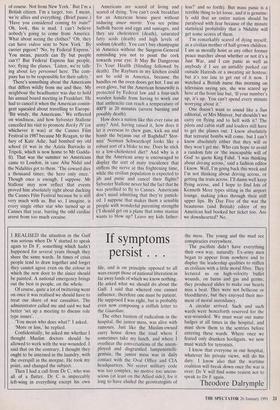If symptoms persist . . .
I REALISED the situation in the Gulf was serious when Dr V started to speak again to Dr F, something which hadn't happened for several years though they share the same wards. In times of crisis people tend to draw together and forget they cannot agree even on the colour in which the new door to the sluice should be painted. A national emergency brings out the best in people, on the whole.
Of course, quite a lot of twittering went on once it was realised we should have to treat our share of war casualties. The administrator called me and said we had better 'set up a meeting to discuss role type issues'.
`You mean who does what?' I asked. `More or less,' he replied.
Confidentially, he asked me whether I thought Muslim doctors should be allowed to work with the war-wounded. I said that on the contrary, I thought they ought to be interned in the laundry, with the overspill in the morgue. He took my point, and changed the subject.
Then I had a call from Dr C, who was all of a flutter. Dr C is impeccably left-wing in everything except his own
life, and is on principle opposed to all wars except those of national liberation in far away lands of which we know nothing. He asked what we should do about the Gulf. I said that whereof one cannot influence, therefore one must be patient. He supposed I was right, but is probably even now composing a stiffish letter to the Guardian.
The other bastion of radicalism in the hospital, the junior mess, was alive with rumours. Just like the Muslim-owned curry house down the road where I sometimes take my lunch, and where I overhear the conversations of the unem- ployed and disgruntled lumpenintelli- gentsia , the junior mess was in daily contact with the Oval Office and CIA headquarters. No secret military code was too complex, no motive too uncon- scious (at least on the Allied side), for it long to have eluded the geostrategists of the mess. The young and the mad see conspiracies everywhere.
The pacifists didn't have everything their own way, naturally. Ex-army men began to appear from nowhere and to display the leadership qualities to stiffen us civilians with a little moral fibre. They lectured us on high-velocity bullet wounds, on burns and gas and germs; they produced slides to make our hearts miss a beat. They were not bellicose or bloodthirsty, but they enjoyed their mo- ment of moral ascendancy.
A circular arrived. Such and such wards were henceforth reserved for the war-wounded. We must wear our name badges at all times in the hospital, and must show them to the sentries before entering these wards. Where once we feared only drunken hooligans, we now must watch for terrorists.
I know that everyone in our hospital, whatever his private views, will do his duty. I know also that the wartime coalition will break down once the war is over: Dr V will find some reason not to speak to Dr F again.
Theodore Dalrymple


























































 Previous page
Previous page